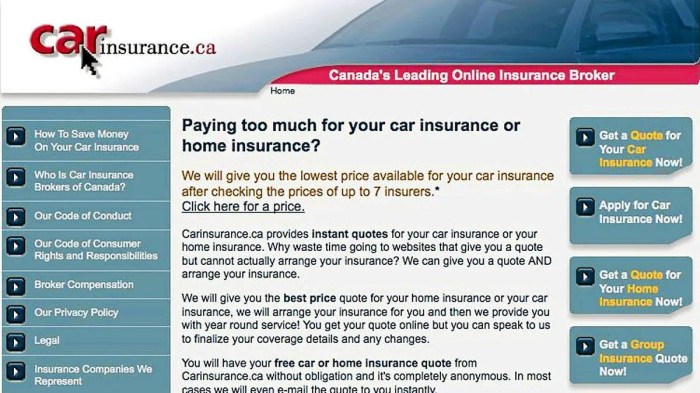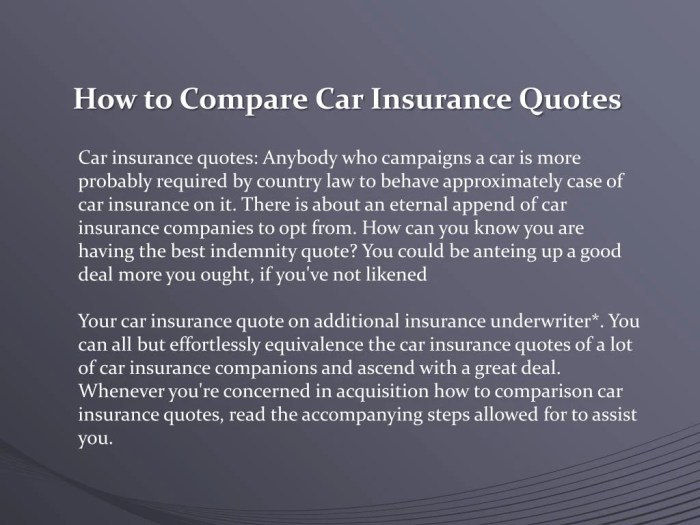How to compare car insurance quotes? It’s a question that pops up in the minds of many car owners, especially when it’s time to renew or switch policies. Navigating the insurance landscape can be a maze of confusing terms, varying prices, and hidden fees.
But fear not, because this guide will equip you with the knowledge and strategies to compare car insurance quotes like a pro!
The journey to finding the best car insurance deal begins with understanding your individual needs. This means taking a good look at your driving habits, the type of vehicle you own, and the level of coverage you require. Don’t be afraid to delve into the different types of car insurance coverage, like liability, collision, and comprehensive, to understand their benefits and how they align with your personal risk tolerance.
Understanding Your Needs
Before diving into the exciting world of car insurance quotes, it’s crucial to understand your unique needs and circumstances. This will help you narrow down your search and find the most suitable coverage for your specific situation. After all, the right car insurance policy should provide peace of mind and financial protection in case of an accident.
Driving Habits and Vehicle Usage
Your driving habits and how you use your vehicle significantly influence the cost of your car insurance. Insurance companies assess factors such as:
- Driving experience:Drivers with more experience typically pay lower premiums, as they are statistically less likely to be involved in accidents.
- Annual mileage:The more you drive, the greater the chance of an accident, leading to higher premiums.
- Driving history:Accidents, speeding tickets, or other traffic violations can increase your insurance costs.
- Purpose of vehicle:If you use your car primarily for commuting or personal use, you might pay less than someone who uses it for business or long-distance travel.
Types of Car Insurance Coverage
Car insurance policies offer various types of coverage, each designed to protect you and your vehicle in different situations. Understanding these coverages is essential to choosing the right policy for your needs.
Liability Coverage
Liability coverage protects you financially if you are at fault in an accident that causes injury or damage to others. It covers:
- Bodily injury liability:Pays for medical expenses, lost wages, and other damages caused to the other party’s injuries.
- Property damage liability:Covers repairs or replacement costs for damage to the other party’s vehicle or property.
Collision Coverage
Collision coverage pays for repairs or replacement costs for your vehicle if it’s damaged in an accident, regardless of who is at fault.
It’s important to note that collision coverage usually has a deductible, which is the amount you pay out of pocket before your insurance kicks in.
Comprehensive Coverage
Comprehensive coverage protects your vehicle against damages caused by non-accident events, such as:
- Theft
- Vandalism
- Natural disasters
- Fire
Like collision coverage, comprehensive coverage usually has a deductible.
Other Coverage Options
In addition to the core coverages mentioned above, some insurance companies offer optional coverage, such as:
- Uninsured/Underinsured Motorist Coverage:Protects you if you’re hit by a driver without insurance or with insufficient coverage.
- Personal Injury Protection (PIP):Covers your medical expenses, lost wages, and other damages regardless of who is at fault.
- Rental Reimbursement:Helps cover the cost of a rental car while your vehicle is being repaired.
- Roadside Assistance:Provides services like towing, flat tire changes, and jump starts.
Determining the Right Level of Coverage
Choosing the right level of coverage is a personal decision that depends on various factors, including:
- Your financial situation:Consider how much you can afford to pay out of pocket in case of an accident.
- The value of your vehicle:If you have a new or expensive car, you may want to consider higher coverage limits.
- Your risk tolerance:Are you comfortable with a higher deductible to save on premiums, or do you prefer more coverage and a lower deductible?
Gathering Quotes from Multiple Insurers
You’ve determined your needs, now it’s time to gather quotes! This is where the fun begins. Getting quotes from various insurance companies is like shopping for the perfect pair of shoes
you want to compare and contrast to find the best fit for your budget and needs.
Methods for Obtaining Quotes
There are several ways to obtain car insurance quotes, each with its own pros and cons. Here’s a breakdown:
- Online Platforms:These platforms are like digital insurance brokers, allowing you to compare quotes from multiple insurers in one place. They’re convenient, quick, and usually free. Some popular online comparison websites include:
- Policygenius:This platform compares quotes from top insurers and offers personalized recommendations.
It’s known for its user-friendly interface and comprehensive coverage options.
- The Zebra:This platform specializes in comparing quotes for different types of insurance, including car insurance. It’s known for its vast network of insurers and detailed quote comparisons.
- Insurify:This platform offers a quick and easy way to compare quotes from multiple insurers. It’s known for its simple design and ability to provide personalized recommendations.
- Policygenius:This platform compares quotes from top insurers and offers personalized recommendations.
- Phone Calls:Calling insurance companies directly allows for personalized conversations with agents. You can ask specific questions and receive tailored advice. However, this method can be time-consuming and may involve multiple calls.
- In-Person Consultations:Meeting with an insurance agent in person offers the opportunity for face-to-face interaction and detailed explanations. You can ask questions and receive personalized recommendations. However, this method requires scheduling appointments and may be less convenient.
Comparison of Popular Insurance Comparison Websites
| Website | Key Features | Benefits |
|---|---|---|
| Policygenius | Personalized recommendations, comprehensive coverage options, user-friendly interface. | Provides tailored advice, simplifies the comparison process, offers a wide range of options. |
| The Zebra | Vast network of insurers, detailed quote comparisons, multiple insurance types. | Offers a wide range of choices, provides in-depth comparisons, caters to diverse insurance needs. |
| Insurify | Quick and easy quote comparison, simple design, personalized recommendations. | Saves time and effort, provides a clear overview of options, offers tailored suggestions. |
Analyzing and Comparing Quotes

Now that you have a collection of quotes from various insurers, it’s time to put on your detective hat and delve into the details. Comparing quotes isn’t just about finding the cheapest option; it’s about finding the best value for your needs.
Understanding Key Factors, How to compare car insurance quotes?
The most important factors to consider when comparing quotes include premiums, deductibles, coverage limits, and other key factors.
- Premiums:This is the amount you pay for your insurance policy. Lower premiums are always tempting, but remember, they may come with less coverage or higher deductibles.
- Deductibles:This is the amount you pay out of pocket before your insurance kicks in. Higher deductibles generally lead to lower premiums, but you’ll have to pay more in the event of a claim.
- Coverage Limits:These define the maximum amount your insurer will pay for a covered claim. Higher limits provide more protection, but also result in higher premiums.
- Other Factors:Beyond the basics, consider factors like roadside assistance, rental car coverage, and other add-ons. These can add to the cost but may be valuable depending on your needs.
Discounts
Discounts are a valuable tool for lowering your insurance costs. Insurers offer a wide range of discounts based on factors like good driving history, safety features in your car, and even your occupation.
- Good Driver Discounts:These are often the most significant discounts and reward drivers with clean driving records.
- Safety Feature Discounts:Cars equipped with anti-theft systems, airbags, and other safety features can qualify for discounts.
- Other Discounts:Look out for discounts for bundling your car and home insurance, being a member of certain organizations, or even completing a defensive driving course.
Hidden Fees and Terms
Don’t let the initial quote fool you. Some insurers may have hidden fees or terms that can significantly increase your costs.
- Administrative Fees:Some insurers charge administrative fees for policy changes or cancellations.
- Surcharges:Be aware of surcharges for factors like driving a car with a high-performance engine or having a young driver on your policy.
- Coverage Exclusions:Read the fine print to understand what your policy doesn’t cover. For example, some policies may exclude certain types of damage or events.
Evaluating Insurance Companies

You’ve gathered quotes from multiple insurers, but the job isn’t done yet. Now, it’s time to dig deeper and evaluate the companies themselves to find the best fit for your needs. Think of this step as getting to know the potential partners who will protect your vehicle and your finances.
You wouldn’t jump into a business deal without due diligence, and choosing an insurance company is no different.
Financial Stability
A financially stable insurance company is essential. If your insurer goes bankrupt, you could be left without coverage. You need to know they can pay out your claims when you need them most.Here’s how to assess financial stability:
- Check Financial Ratings:Organizations like A.M. Best, Moody’s, and Standard & Poor’s provide independent financial ratings for insurance companies. Look for companies with high ratings, indicating a strong financial position.
- Research Company Finances:Review the insurance company’s annual reports and financial statements. These documents provide insights into their financial health, profitability, and ability to handle claims.
Customer Service
Great customer service can make a big difference, especially when you’re dealing with a stressful situation like an accident. Here’s how to gauge customer service:
- Read Customer Reviews:Check websites like Trustpilot, Consumer Reports, and the Better Business Bureau to see what other customers say about the company’s responsiveness, helpfulness, and overall customer experience.
- Contact the Company:Reach out to the insurance company with a simple question or concern. See how quickly they respond, how helpful they are, and how easy it is to navigate their communication channels.
Claims Handling Process
How smoothly a company handles claims is crucial. You want a process that is efficient, transparent, and fair.Here’s how to evaluate claims handling:
- Review Claims Satisfaction Ratings:Look for industry reports or customer surveys that assess how well insurance companies handle claims. These ratings can provide valuable insights into the company’s claims processing speed, customer satisfaction, and fairness in settling claims.
- Look for Transparency:Research the company’s claims process. Do they have a clear and detailed explanation of how claims are filed and processed? Are there online resources or tools available to make the process easier?
Reputation
An insurance company’s reputation speaks volumes. Look for companies with a strong track record of ethical business practices, fair pricing, and customer satisfaction.Here’s how to research reputation:
- Check News and Media:Search online news sources and industry publications for articles and reports about the insurance company. Look for any recent controversies, scandals, or negative press coverage.
- Consult Industry Organizations:Professional organizations like the Insurance Information Institute or the National Association of Insurance Commissioners often provide information and resources about insurance companies, including their reputation and any regulatory actions taken against them.
Large vs. Small Insurers
There’s no one-size-fits-all answer when it comes to choosing between large, well-established insurance companies and smaller, regional insurers. Each option has its pros and cons.
Comparing car insurance quotes is like trying on different hats – you want to find the one that fits your budget and needs best. Just like you might look for a Affordable Health Insurance Policy9 to cover your medical expenses, you want a car insurance policy that protects you without breaking the bank.
So, don’t be afraid to shop around and compare quotes to find the best deal!
Large Insurance Companies
- Pros:
- Strong Financial Stability:Large insurers typically have more financial resources, making them less likely to go bankrupt.
- Wide Availability:Large insurers often have a wider network of agents and offices, making it easier to find coverage and get help.
- Advanced Technology:Large insurers tend to invest more in technology, which can translate into a more streamlined and efficient claims process.
- Cons:
- Higher Premiums:Large insurers often have higher premiums due to their overhead costs and wider reach.
- Less Personalized Service:With a large customer base, you may not receive as much personalized attention from a large insurer.
- Bureaucracy:Large insurers can be more bureaucratic, making it harder to navigate their systems and get quick resolutions.
Small Insurance Companies
- Pros:
- Lower Premiums:Smaller insurers often have lower premiums because they have lower overhead costs and a smaller customer base.
- More Personalized Service:Small insurers may offer more personalized attention and faster claim processing times.
- Strong Community Ties:Smaller, regional insurers may have a stronger commitment to supporting their local communities.
- Cons:
- Less Financial Stability:Smaller insurers may have fewer financial resources, potentially making them more vulnerable to financial difficulties.
- Limited Availability:Smaller insurers may not have as wide a network of agents or offices, making it harder to find coverage in certain areas.
- Limited Resources:Smaller insurers may have fewer resources for technology and customer service, which could lead to longer wait times or less efficient claims processing.
Making an Informed Decision

You’ve gathered quotes, compared prices, and now it’s time to make the final call. This is where your research and understanding of your needs truly pay off. You’re not just picking the cheapest option; you’re choosing a policy that offers the best value and protection for you.
Choosing the Best Policy
Once you’ve analyzed the quotes and considered your needs, it’s time to make a decision. Here are some key factors to consider when selecting the best car insurance policy for you:
- Coverage Limits:Ensure the coverage limits (liability, collision, comprehensive, etc.) meet your individual requirements and financial situation. Higher limits generally mean higher premiums but offer more protection in case of accidents.
- Deductibles:Choose deductibles that balance your budget and risk tolerance. Higher deductibles generally mean lower premiums but require you to pay more out of pocket in case of a claim.
- Discounts:Take advantage of available discounts, such as safe driving records, good student discounts, or bundling your car insurance with other policies.
- Customer Service and Claims Process:Research the insurer’s reputation for customer service and their claims handling process. Look for companies known for prompt and fair claim settlements.
- Financial Stability:Choose a financially stable insurer to ensure they’ll be there when you need them. Look at their ratings from organizations like A.M. Best or Standard & Poor’s.
Negotiating with Insurance Companies
While insurance premiums are generally set, there’s often room for negotiation. Here’s how to get the best possible rates:
- Shop Around:Don’t be afraid to compare quotes from multiple insurers, even after you’ve narrowed down your choices. This competition can sometimes lead to better rates.
- Ask for Discounts:Inquire about any available discounts you might qualify for. Be prepared to provide documentation to support your eligibility.
- Bundle Policies:If you have multiple insurance needs, such as homeowners or renters insurance, see if bundling them with your car insurance can save you money.
- Be Polite and Persistent:Approach the negotiation process with a polite and persistent attitude. Explain your situation and be prepared to justify your request for a lower rate.
- Don’t Be Afraid to Walk Away:If you’re not satisfied with the offered rate, be prepared to walk away. Sometimes, a little pressure can motivate an insurer to offer a more favorable deal.
Important Considerations Before Finalizing a Policy
Before signing on the dotted line, make sure you’ve addressed these key points:
- Review the Policy:Read the policy document carefully, paying close attention to the coverage details, exclusions, and conditions.
- Ask Questions:Don’t hesitate to ask questions about anything you don’t understand. The insurer should be happy to clarify any details.
- Compare Apples to Apples:Make sure you’re comparing quotes that offer the same level of coverage. Don’t just focus on the premium; ensure the coverage matches your needs.
- Consider Long-Term Costs:While a lower premium might be tempting, consider the potential for future rate increases or claim denials. Choose a company with a good track record and reliable customer service.
Concluding Remarks: How To Compare Car Insurance Quotes?
Armed with the knowledge of your needs, the tools to gather and analyze quotes, and the wisdom to evaluate insurance companies, you’re ready to make an informed decision about your car insurance. Remember, the goal is to find a policy that offers the right coverage at a price that fits your budget.
Don’t settle for the first quote you see; take your time, compare, and choose the policy that truly protects you and your vehicle.
Expert Answers
What is the best way to compare car insurance quotes?
The best way is to use a combination of online comparison websites, direct insurer quotes, and potentially talking to an insurance broker for personalized advice.
What information do I need to provide when getting a quote?
You’ll typically need your driver’s license, vehicle information (make, model, year), address, and driving history.
Should I choose the cheapest quote?
Not necessarily. Always prioritize the level of coverage and the insurer’s reputation before solely focusing on the price.
How often should I compare car insurance quotes?
It’s a good idea to compare quotes at least annually, and especially when your policy is up for renewal.